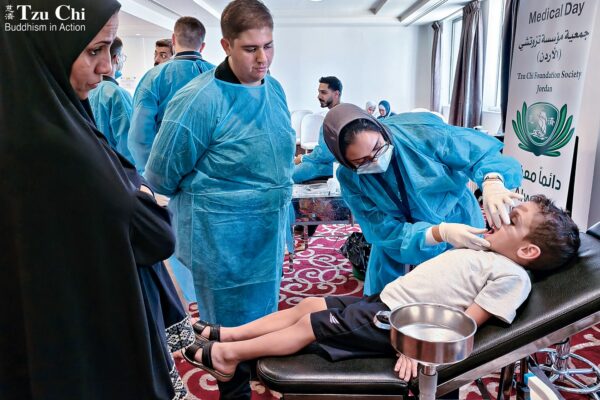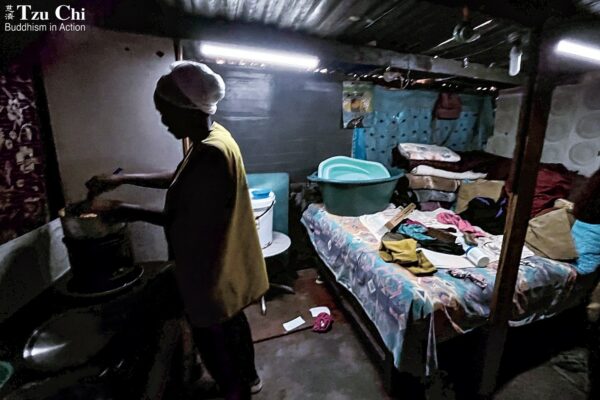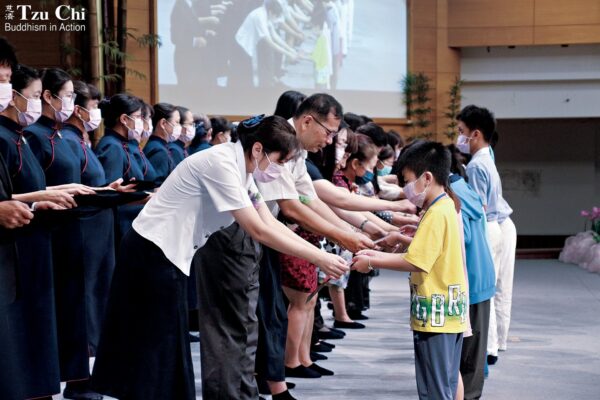By Huang Xiao-zhe and Cai Yu-xuan
Translated by Wu Hsiao-ting
Photos by Huang Xiao-zhe

Every recycling volunteer has their own life story and their own reason for joining Tzu Chi’s recycling cause. Zheng Hua-qi (鄭驊琪), for example, is a Tzu Chi care recipient-turned-recycling volunteer. I first met her in early April this year at the Tzu Chi Fuxing Recycling Station in Taichung, central Taiwan. Seven years ago, when she was 60—an age when some people are already enjoying a laid-back retired life—fate dealt her a hard hand. She suffered not one, but two strokes that year. The strokes resulted in the paralysis of her right arm and leg and made her financially constrained life even harder.
Zheng was plunged into such despair that she contemplated suicide. But thanks to Tzu Chi volunteers’ unfailing support and care, she was able to rediscover a sense of hope and pick herself back up. The volunteers touched her so profoundly that she made a pledge to herself at the time: “Once I get better, I’ll start helping others and collecting recyclable garbage for Tzu Chi to help the foundation do good.”
And that was exactly what she did. It has been seven years since she had the first stroke, and even though she still can’t move her arm and leg freely, she works hard at recycling. She even donates money every month for charitable purposes, despite her limited means. You can tell from her backlit figure in the photo that she relies on a walking aid to move around. Her physical limitations, however, are no match for her determination to help others and contribute to society. She demonstrates through her altruistic actions an indomitable spirit that refuses to succumb to life’s tribulations.
Sorting recyclables with one hand and leg
Zheng volunteers at least twice a week at the Fuxing Recycling Station, even though every trip out of her home is a test of her physical stamina and psychological willpower. She rides a three-wheeled motor scooter to get around. Because her right hand has deformed and atrophied as a result of the strokes, she first uses her left hand to spread apart the fingers on her right hand before placing it on the handlebar. She also wears a drop foot brace on her right foot for support.
She arrives by eight in the morning on the days she serves at the station, and works in the plastic bag sorting area. A woman of few words, she goes about her work quietly. Her right hand and leg are too weak to be of any help to her, but she functions well enough with her left hand and leg—she just needs more time to finish a task.
During a chat with her, she told me that she originally lived in Keelung, northern Taiwan. She had moved to Taichung just a year before, when she learned that her son had fallen ill. Before her first stroke, she drove a small truck every day to a fishing harbor to run a food stall. She never thought her simple life would change—who was to know that two strokes would hit her within a year and alter her life forever? Fortunately, she was able to take up recycling work, which filled her with a renewed purpose after her illness rendered her unable to work.
When she still lived in Keelung, she made daily trips on her three-wheeled scooter to Badouzi Fishing Port or Shen’ao Fishing Port, familiar places to her, to pick up recyclable garbage. She collected recyclables from people living nearby too. She kept at it, rain or shine, cold or hot, unbothered by the stench of garbage or the injuries she sometimes received from fish hooks mixed in with the garbage she rummaged through to find reusable resources. She kept up her volunteer work after moving to Taichung, remaining as steadfast as ever in her commitment to recycling.
Persistence at physical therapy
Zheng goes to the hospital five days a week for physical therapy. She persists at such a regimen to prevent the atrophy of her paralyzed muscles and to regain as much physical function as possible. Her treatment is complemented by acupuncture, which helps relieve the pain from tense muscles.
On one of the days I visited the recycling station, I decided to go with Zheng as she was leaving the station at 11 a.m. for the hospital for her rehabilitation. After seeing her do all the stretching and other exercises to strengthen her limbs, I came to a deeper realization of the inconveniences she has to endure every day. When she was doing the stretching exercises, she had to first lie flat on a rehabilitation bed. Just the simple action of getting herself onto the bed and lying down—something that would take a normal person just a few seconds—took her nearly ten minutes to complete. She had to use all her might and bite through the pain that came with the simple movements. It’s difficult for an outsider to imagine the mental and physical ordeals she must have had to go through every day for the past seven years.
Her path to recovery seems so long and painful, but she doesn’t consider it a hardship. She views all she has to go through as her spiritual training, and has thus been able to adjust her mindset and think more positively. Not only that, but she uses the parts of her body that can still function normally to do good. Her strength and resilience are admirable.
Overcoming a rough patch
Another day at the recycling station, I saw Zheng, having finished sorting some plastic bags, grip her quad cane with her left hand before slowly rising from her stool and straightening up her body. Then she removed her mask, took a breath, and broke into a rare bright smile. She told me that when she first started volunteering at the recycling station, everyone was wonderful to her, even though they barely knew her. She wasn’t good at classifying plastic bags at the time and her movements were slow, but the volunteers were very patient with her, teaching her what she needed to know and giving her a lot of encouragement. Their kindness and support made the recycling station feel like a big, warm family.
“These two bracelets were given to me by Master Cheng Yen,” she said as she pointed to the bracelets of Buddhist prayer beads on her right wrist. She said she was lucky to have the help of Tzu Chi volunteers and the guidance of Master Cheng Yen when she had her strokes. During that time she was hospitalized for more than a month. Tzu Chi volunteers visited her in the hospital and gave her a lot of support. The Master’s televised Dharma talks likewise gave her a lot of encouragement. She said that without the Master and the volunteers, she wouldn’t be where she was now. They had inspired her to take up recycling and do what she could to help others.
Having turned from an aid recipient into a help giver, Zheng is now even able to use her own story to inspire and instill hope in other people. I sincerely hope that after all her tribulations, her life will get better and better and that peace and joy will accompany her every day.



